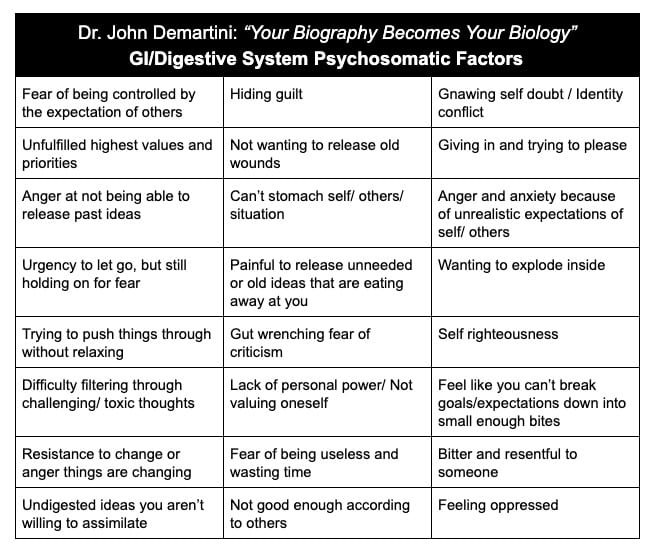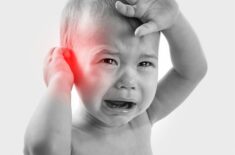Is your anxiety impacting your gut health or is your gut health impacting your anxiety?
Both may be true.
Recent research is uncovering the connection between mood disorders, anxiety disorders, and imbalances in the digestive tract.
There is a lot going on inside the folds of your gastrointestinal tract (GI tract).
You may have heard that your gut is home to trillions of gut microbiota that make up your gut microbiome.
But did you know that your gut is also considered a “second brain” that has its own nervous system too?
It’s called your enteric nervous system and it interacts constantly with your central nervous system (your head brain and spinal cord).
All of these elements work together in synergy – your gut microbes (gut flora) communicate with your gut-brain which communicates with your head brain to create what’s known as the Microbiome-Gut-Brain Axis.
The main communication highway between the gut and brain is called the Vagus nerve.
Your gut-brain sends way more information to your head-brain than vice versa.
It’s estimated that gut-brain communication accounts for about 90% of information shared and brain-gut communication for only 10% of information shared. (1)
An imbalance in the gut can greatly impact overall health, brain function, and even immune system function.
You may be familiar with more obvious conditions caused by gut imbalances like IBS (irritable bowel syndrome), but did you know that a messed up gut can also create or exacerbate anxiety symptoms too?
So how do we deal with persistent gut and anxiety symptoms?
I’ll give you a couple of practical tips at the end here, but first here’s a little known but equally powerful alternative way to deal with your symptoms…
Anxiety – Gut Connection Psychosomatics:
The term ‘psychosomatic’ refers to symptoms caused by a mental-emotional factor rather than a physical one.
So can you for a minute entertain the possibility that your gut/anxiety symptoms are a form of feedback?
What if whatever you’re experiencing is actually trying to get your attention to look at something in your life that needs healing?
What if your symptoms are actually a gift that’s trying to get you to live more authentically and empowered?
I know this is a novel notion to many but stay with me here…
I’d like to share with you some powerful information that helped me greatly in dealing with both my anxiety and my digestive issues.
This information continues to help me unravel decades worth of repressed crap, as well as deepen my understanding of myself, my body, and my conditions.
Consider it a roadmap to help you navigate on your Recovery Journey so you know what the guideposts are for your repressed emotions, triggers, traumas, and imbalanced perceptions.
In his course titled Prophecy II: How to Decode Your Body’s Messages, Dr. John Demartini outlines key wellness and illness principles and goes into great detail about the body and all its systems, every condition and disease related to those body systems, and also the psychosomatic factors involved.
(If you’d like to learn more about his course go here.)
The following is a general summary of the psychosomatic factors involving the Anxiety – Gut Connection as per Dr. Demartini’s course section involving the GI/Digestive System.
As we’ve seen, these two play off each other and are almost always impacting each other, even if we experience no obvious physical symptoms.
(You’ll notice that often the psychosomatic factors are facets and little reflections of our overarching anxiety.)
The Digestive System goes from our mouth to our anus. (input → output)
Psychosomatically, it is generally involved with the ingesting (input), assimilating, digesting, and releasing (output) of information and ideas.
Main digestive organs: mouth, pharynx, esophagus, stomach, small intestine, large intestine (colon), and anus/rectum
Accessory digestive organs: pancreas, liver, and gallbladder
As you read through each psychosomatic item, make note of the ones that most resound and resonate with you and your life – they are little flags signaling that that is exactly what you’ll need to work on during your Recovery Journey:

Be honest with yourself as you go through this.
I know this can be confronting but it’s also liberating and freeing to uncover blind spots so try and stick with it.
Which of the items below most resonates with you?
Choose 5-7 to start and work from there:
Fear of being controlled by the expectation of others
Hiding guilt
Gnawing self-doubt / Identity conflict
Unfulfilled highest values and priorities
Not wanting to release old wounds
Giving in and trying to please
Anger at not being able to release past ideas
Can’t stomach self/ others/ situation
Anger and anxiety because of unrealistic expectations of self/ others
The urgency to let go, but still holding on for fear
Painful to release unneeded or old ideas that are eating away at you
Wanting to explode inside
Trying to push things through without relaxing
Gut-wrenching fear of criticism
Self-righteousness
Difficulty filtering through challenging/ toxic thoughts
Lack of personal power/ Not valuing oneself
Feel like you can’t break goals/expectations down into small enough bites
Resistance to change or anger things are changing
Fear of being useless and wasting time
Bitter and resentful to someone
Undigested ideas you aren’t willing to assimilate
Not good enough according to others
Feeling oppressed
It’s wise to take a holistic healing approach to any digestive or anxiety symptoms.
Often times we tend to solely focus on the physical action steps to healing that we forget that the mental/emotional (psychosomatic steps) are equally important.
(Sometimes maybe even more.)
Yes, it’s extremely important to watch your daily diet and make sure you’re consuming enough naturally rich-probiotic foods such as sauerkraut and kimchi as well as taking a personalized probiotic supplement containing specific types of good gut bugs such as bifidobacterium and lactobacillus.
A healthy gut will also benefit from a diet rich in prebiotics – these are indigestible fibers that act as food and fuel for the beneficial intestinal flora.
Prebiotic-rich foods include asparagus, onions, and leeks.
This can all have a positive effect on your mood and mental/emotional health as well as your gut health and intestinal microbiota…
And let’s also not forget the importance of keeping your emotional house in order.
By uncovering what hidden triggers may be influencing or impacting your gut health and mental health you can start to create momentum to move towards transformation and healing.
This is the first step.
REFERENCES
:
(1) https://www.sciencealert.com/you-have-a-second-brain












